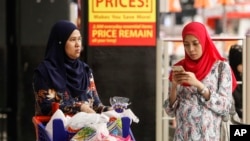People in Asia's developing countries believe the next generation of women will face a tough time combating gender inequality, according to a survey released on Friday.
The survey across Asia by credit card company Mastercard asked 8,700 people if they thought gender equality would become worse, remain the same or get better in the future.
Poorer countries, such as Vietnam, Indonesia and Myanmar were most pessimistic about advances in women's equality, while respondents in richer nations such Australia and Singapore expected progress.
The "next generation well-being" index, based on the survey of 17 developed and emerging market countries, used a scale with 0 being completely negative, 50 neutral and 100 maximum positive.
Among the developing countries index scores were highest in Malaysia (54.4), the Philippines (36.5) and Thailand (27.1), and lowest in Myanmar (11.6), Indonesia (9.5) and Vietnam (1.9).
Developed nations
By comparison, the seven developed countries surveyed collectively scored 62.6, with Taiwan (84.3), Australia (71.0) and Singapore (64.8) most optimistic about gender equality improving in the future.
The scores in wealthier nations show "women are looking to consolidate the gains their mothers fought for," said Pauline Tweedie, the deputy country representative in Thailand for the Asia Foundation, a nongovernmental development organization.
"It's not surprising that they think it will continue to improve because they've seen improvements in the past. That would also explain why Malaysia is so high," Tweedie said.
"Conversely, when you look at developing countries, women still haven't realized those gains yet, so they're not necessarily positive about the future," she said.
MasterCard also asked the respondents, who ranged in age from 18 to 64, about financial inequality, work-life balance and natural disasters.
The emerging market countries in Asia – which are the hardest hit by climate change-related impacts – felt pollution and natural disasters would get worse, scoring 27.2, compared to a relatively neutral 52.8 in developed countries.





